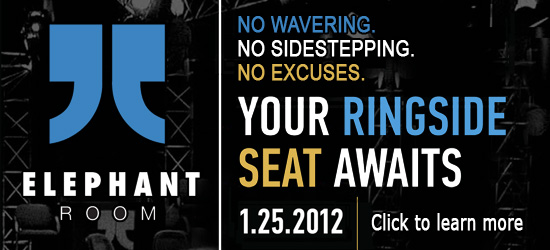No doubt there have to be differences among you to show which of you have God’s approval. — I Corinthians 11:19
 Differences. Disagreements. Conflict. Brawls. Few of us like having them. In fact, many of us avoid them.
Differences. Disagreements. Conflict. Brawls. Few of us like having them. In fact, many of us avoid them.
Which is a shame. Especially for Christians.
Yes, believers are commanded to love one another, live in unity, pray for our enemies, and turn the other cheek. But we’re also told to speak the truth in love, earnestly contend for the faith, correct, reprove, and rebuke. The Church is called to be a place of rigorous intellectual debate as much as it is called to be a place of caring, compassionate refuge.
So when did we replace our hard-nosed curiosity with namby-pamby, milquetoast Christianity?
Several weeks back, in my post Why You Should Review Books You Don’t Like, the fur flew. I have long suggested that we Christian writers have constructed an echo-chamber of positivity that prevents us from really growing in the craft and sensitizes us to negative reviews. And many Christian writers just don’t want to hear that. For the record, I have NO problem with people disagreeing with me.
My problem is with Christians who avoid the debate.
Which is probably why I am so intrigued by The Elephant Room. Have you heard about this? It’s a forum of confessing Christian leaders, from wildly different traditions, who candidly debate hot-button issues. But, as you can imagine, this type of debate riles people.
Namely those who don’t like debate.
Or who think there is only one way to see an issue.
In his post The Elephant in the Room, Todd Rhoades talks about the event and some of the responses. He writes,
Events like this sharpen me. They give me greater perspective. And they allow me to search scripture to see areas that I may need to take a second look.
That scares some people.
Why would I want to listen to someone who doesn’t agree with me?
Seriously? I actually WANT to listen to people who don’t agree with me. It allows me to sharpen my own beliefs and thought processes.
But it’s much easier for many, rather than joining in and giving a fair shake with those they disagree with, to tear them down before they even have a chance to speak.
…The premise of the Elephant Room is that there is a lot we can learn from the conversation. But the truth is… some people aren’t interested in having the conversation. It makes them too uncomfortable. (emphasis mine)
Frankly, I feel the same way about the Christian writing community. (Maybe we need an Elephant Room: Christian Fiction Edition. Huh?)
As I wrote several years ago regarding the brief skirmish between Ted Dekker and Steeple Hill, popular voices on polar ends of the Christian publishing industry spectrum,
As much as we Christians cringe at this type of public exchange, I can’t help but feel it is ultimately good for the writing community …Incidents like this provide unparalleled opportunity for us to grow up, grow closer, and sharpen our collective vision and our witness.
And then there’s those who prefer to run and hide.
Call me “mean,” “divisive,” a “trouble-maker.” Go ahead. I still believe there can be value in a good brawl; disagreements, controversies, and debates can sharpen us, help us grow, refine our thinking, and broaden our understanding of God, others, and the world. Like the Church, the Christian writing community should be a place of rigorous intellectual debate, humility, and candor, rather than an echo chamber of attaboys, a house of mirrors, a cult of “niceness” whose initiates “see no evil” and “speak no evil.”
If not, I fear the only elephant in the room will be our own cowardice.
















Anyone who knows me for five seconds generally picks up on the fact that I enjoy debate and I analyse everything out of sheer habit. That’s my personality type–and it doesn’t often fit in with what large sectors of Christianity are. It’s fine with me because I think that I and the people like me are an essential part of that one body, even though we’re the part no one wants to talk about.
I believe that debate is a very healthy thing when handled respectfully.
The problem with ecclesiastic debate, however, is that I firmly believe that while these are healthy and good and right for the Church, they should be kept _within the Church_ as much as possible. It sticks in my mind that there is a verse in the Pauline epistles that I’m not recalling off hand….but I really do believe there’s one that says we are not to let the world see our squabbles. And I know a lot of people also use the by-now-way-overused “stumbling block” section to cry off conflict and growth. “If people see me debating it will drive them away from God, so I’ll just make a casserole.” And then others also rely on Blessed are the Meek and the Peacemakers. But everyone seems to forget that the first thing Jesus did when he went to town with his mom and dad was to hit the Temple for a rabbinic debate. I’ve sat in on more than one of those and they’re _not_ for the fainthearted. All those great quotes from Jesus about casting the first stone and rendering unto Caeser also happened during scholarly internal debate. Jesus loved exploring God that way. So I see no harm in it at all…as long as we aren’t making a public spectacle of the Church. (cf. the Rob Bell debate from last year; the recent Mark Driscoll sex thing.)
Katherine, keeping things behind closed doors sounds good in theory. On a personal level, some things definitely need to stay behind closed doors. But I’m not so sure about doctrinal debates. Sure, there are some who will use it as a opportunity to mock the Church. But they’re probably looking for ANY opportunity. The Rob Bell thing was launched publicly and I thought it was fair game. Besides, it involved a subject that is essential for Christians to think through. The debate helped me to rethink some of what I’ve come to believe. All that to say, I wouldn’ equate doctrinal debates as airing dirty laundry. Especially if the dialog is civil.
Totally love the idea of a Christian fiction Elephant Room (it’s why I joined Edgy Christian Writers). It’s why I love this blog! Part of growth as a Christian is getting deep into the Bible and asking those hard questions. Sometimes, NO ONE has the answers, even preachers (I would argue that Revelation is one of those as-yet largely inexplicable books…and of course people would heartily disagree).
I do think that we need to be in CHURCHES where we can agree on the basics, otherwise, we present a disjointed front to the local community, often arguing b/c of conservative vs unconservative views. I also think we need to keep our Christian debates among ourselves, that is, not biting and devouring one another on the internet just because we don’t agree on something that’s an issue of Christian liberty.
But there are things to fight for, and those things we sometimes have to take a stand on, even with other Christians, or those who CLAIM to be. I love reading how the prophets in the OT had to take stands on things, even when people hated them for hearing it.
I agree with you, Mike! Let’s talk about the hard stuff and learn from each other!
I do like debating Christians, but only in closed forum. I don’t want nonbelievers jumping in with their opinions and running everything off the rails. I just had a great debate with my sister about whether we’ll all get to Heaven at the same time, or if there are people there already. The great thing about it was that we didn’t have some random guy walking in off the street going, “Ur dum if u believ in god.”
I’ve had a great time debating Christians on the writing forum I frequent. We’re all arguing from a common ground. We educate each other. We all strive to be kind. It’s absolutely refreshing.
Ha, Kessie, this cracked me up when I read, “UR dum if you believ in god.” You’re right, it does run things way off the rails, when debating Biblical issues.
Amen. Couldn’t agree with you more.
The debating reminds me of an old Chinese academic philosophy- namely that students learn best not by teahcers (like the arrogant American public school system forces you to believe, personal experience on that), but from each other. So I can see why debates would be good for the mind. And all my friends know that I enjoy a good, civilized debate with anyone of any (or no) religion/tradition/whathaveya.
Another good column, Mike.
The problem I have is the bitterness that can arise between Christians over debates. Discussions are fine – debates in which hard feelings are formed and accusations thrown are not.
(My reasoning: I’m on a forum, and there are some debates that ostracized some members to the point that they no longer post because their opposition was offensive and accusatory of their personal salvation without reason.)
Mixed emotions about The Elephant Room. Like Katherine and others here, I am a debater by nature. Put our oldest son and me in a moving vehicle for a couple of minutes and it’s the clash of the Titans. Like the personalities in Elephant Room 1, we aren’t enemies – just love honest and direct swapping of opinions. Bloody noses allowed. I have a good deal of admiration for the participants in this event.
On the flip side, they are at least sitting face-to-face with an agreed upon agenda and some rules of engagement. Too many Internet discussions, web forums, blogs, chats, etc … have no such thing. Throw into the mix the fact people can jump in and out of a cyber discussion and there can be a formula for a lot of heat but not much light.
Christians have to keep at the forefront what our mission in life is. It isn’t to be right or score points! As long as we keep things in perspective, an event like the Elephant Room can be helpful. So my final word would be, proceed with caution and walk in the Spirit.
An excellent post, Mike.